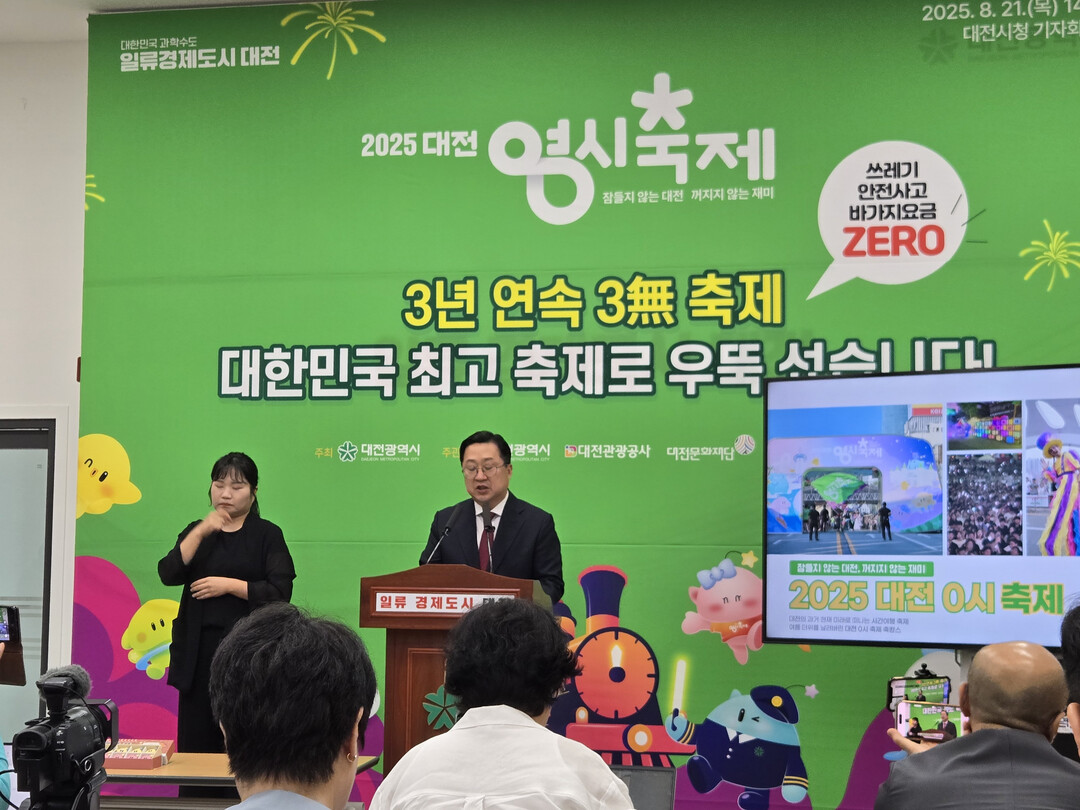
The 2025 Daejeon Zero O'Clock Festival has successfully concluded, attracting 2.16 million visitors. The downtown area of Daejeon was transformed into one of the 'hottest' cities in Korea during the festival, completely shedding its old 'No-Fun City' reputation and earning new nicknames like 'Fun-Fun City,' 'Super-Fun City,' and 'City of Waiting.'
The Daejeon Zero O'Clock Festival is now emerging as a benchmark for local governments nationwide. Officials from over 10 municipalities and related organizations, including Wonju, Cheonan, Boryeong, and Hwacheon, visited Daejeon to learn the secrets of the festival's success. Notably, KBC Gwangju Broadcasting aired a special report titled "The Rebellion of the No-Fun City, Daejeon Zero O'Clock Festival Attracting the MZ Generation," which highlighted Daejeon's success and created a nationwide buzz. Daejeon Mayor Lee Jang-woo expressed his pride, saying, "The fact that local governments from all over the country are coming to learn from our festival means that Daejeon is now at the center of Korean festivals."
The festival's success is not only measured by the large crowds it drew but also by its significant contribution to revitalizing the old downtown area, enhancing the city's brand value, and providing a real boost to the local economy. The total economic effect of this festival is estimated at 402.1 billion won, a figure that combines 110.8 billion won in direct effects and 291.3 billion won in indirect effects. Furthermore, the festival provided part-time jobs for 2,808 university students, contributing to youth employment.
During the festival, the downtown commercial district was more vibrant than ever. Some food stalls saw daily sales exceeding 12 million won, showing explosive popularity. A total of 97 stores across six zones operated, revitalizing the entire local commercial district. The 'goods craze' was particularly strong, with merchandise featuring Daejeon's symbolic mascot, Kkumdori, selling out daily. Kkumdori walnut cakes sold out 9,395 boxes on opening day, and Kkumdori ramyeon and makgeolli sold hundreds of thousands of units within two months of their launch. Total sales of Kkum Family goods during the festival reached 230 million won, a 46% increase from the previous year.
The Power of a 'Festival Created by Citizens,' Not Just 'for Spectators'
One of the biggest success factors of the 2025 Daejeon Zero O'Clock Festival was citizen participation. The festival's finale featured a moving grand chorus of 2,000 citizens. Over 5,900 cultural artists performed in 540 shows, and the participation rate of ordinary citizens in performances increased by 78% compared to the previous year. A total of 4,989 citizens, including 1,695 volunteers, directly participated in the festival's operation, enhancing its quality. Mayor Lee emphasized, "The Daejeon Zero O'Clock Festival is special because it is a 'festival created by citizens,' not just a 'festival for spectators.'"
Spanning Generations, Leaping Toward a Global Festival
This year's festival significantly enhanced its content for family visitors. The Family Theme Park at the former Chungnam Provincial Government building attracted 530,000 visitors, and Kkum Family photo zones scattered throughout the festival gave children special memories. The 'AI Painter Robot' and 'Dancing Robot' received enthusiastic reactions from all ages, reaffirming the city's reputation as a 'City of Waiting.' The '9-Day, 9-Color Parade,' which featured a different theme each day, also became a key content enjoyed by all generations.
The festival's success also shone online. The cumulative views of festival-related content reached 17.28 million, a 49% increase from the previous year. On the Google Trends index, Daejeon ranked first among all local governments nationwide. This explosive SNS response and positive reviews from international visitors have fully demonstrated the potential for the Daejeon Zero O'Clock Festival to grow into a global event.
Three Consecutive Years of a 'Safe and Clean Festival'
In addition to its successful operation, the Daejeon Zero O'Clock Festival achieved both safety and environmental goals. An average of 817 safety personnel were deployed daily, and an AI-based crowd management system was used to analyze real-time congestion. As a result, not a single safety incident occurred for the third consecutive year. Furthermore, 1,200 people were assigned to environmental management, and the festival received praise for being a 'clean, waste-free festival' through the provision of 1.35 million reusable containers and the operation of eco-friendly campaigns.
Mayor Lee Jang-woo stated, "We will not be satisfied with this year's achievements and will repay you with even greater emotion and results next year through new content and bold challenges." He added, "We will work with our citizens to ensure Daejeon becomes a festival city that is recognized not just in Korea but worldwide." The Daejeon Zero O'Clock Festival is now ready to leap from a representative Korean festival to a global one.
[Copyright (c) Global Economic Times. All Rights Reserved.]




























